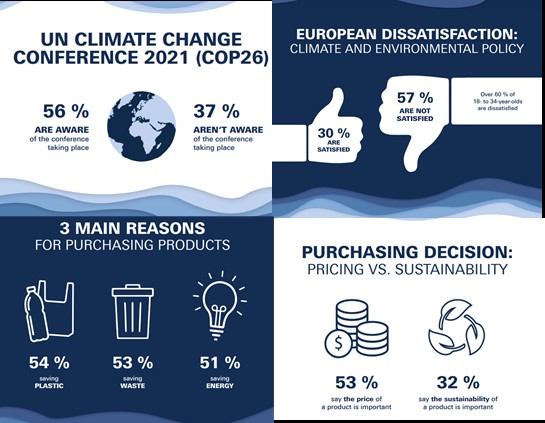Majority of Europeans dissatisfied with the environmental and climate policies
In line with the commencement of the UN Climate Change Conference COP26, Sunday 31st October, GROHE commissioned a YouGov study which surveyed over 7,000 citizens from seven European countries and found more than half (54%) of UK respondents are dissatisfied with the climate and environmental policy in their country.
YouGov conducted a representative survey on behalf of bathroom and kitchen fittings brand GROHE on this topic with data collated from seven European countries including the UK. GROHE reports, as a sanitary brand that has been pursuing sustainable action for decades, climate issues are of vital importance to manufacturer.
Questions included
What are the attitudes in Europe towards the climate crisis? How satisfied are people with climate and
environmental policy in their country? How do they value sustainability?
More than 1 in 4 people surveyed in the UK have not heard about the UN climate summit
The new YouGov findings report that 68% of survey respondents in the UK know that the UN Climate Change Conference is taking place, leaving more than one quarter of participants admitting they were unfamiliar with the upcoming summit.
However, a comparison of respondents across all seven countries surveyed actually puts the UK almost at the top of the rankings. Italy takes the top spot with 74%, with the UK following in close second position at 68%. The majority of those surveyed in the Netherlands and France are also familiar with the conference, with 64% and 59% respectively, whilst Germany and Denmark are almost evenly split with 51%. The least recognition of the conference was found to be in Russia with only 34% reporting their awareness of COP26.
UK lacks belief in meeting 1.5 degrees Celsius Paris Agreement target
When asked whether the 1.5 degree Celsius target is still achievable, just 11% of those surveyed in the UK agreed this was still possible. Meanwhile, a staggering 49% said no whilst 25% said they weren’t aware of the UK’s plans on this matter.
Respondents in France and the Netherlands produced the same data of 11% believing the target was still a manageable target. In general, the study showed that respondents from urban residential areas across Europe are more optimistic about this issue than those living in rural areas.
Are advancements in sustainability being held back by pricing?
When it comes to purchasing decisions, the majority of the UK give priority to price. 57% of those surveyed lead their decision-making process with price in mind – only 29% have the sustainability of the product as a priority. Of all the participating countries, France was the leader in the field with 49% of respondents saying they pay more attention to sustainability when buying. However, on average, the majority of respondents (53%) agree: in the end, price remains the primary deciding factor in purchasing decisions.
Despite price still being a barrier for preventing more sustainable investments, there’s no denying that most of us have been awakened to making more conscious consumer choices where we can. In the UK, we rank saving plastic (53%), energy (52%) and waste (53%) with almost equal importance when it comes to the expectations we have when looking to purchase a new product. Interestingly, CO2 and water fall much further behind with just over a third of the UK (35%) seeking out water-saving credentials, and 39% looking to reduce CO2 emissions from new purchases. Looking at the wider European landscape, the story is quite different in Denmark where 53% are already sensitive to the threat of emissions.
Once again, France leads the country survey in terms of energy and water savings in connection with new purchases: 58% pay attention to low energy consumption and 47% keep an eye on water consumption.
Influencing factors on the road to greater sustainability
Looking ahead to the future, the study sought to understand which factors people see as of central importance for a more sustainable future. In the UK, governmental policy and regulation is considered to have the most significant impact by 39% of people. Meanwhile, 29% of the UK public believe corporate responsibility is the best approach that will garner most impact. Finally, 13% believe that individual doing is the most important action required in order to drive the sustainability transformation in the future.
With increasing awareness of the scarcity of resources and the climate crisis, many companies are dedicating themselves to the challenges of sustainability.
Bathroom and kitchen fittings brand GROHE has embraced this topic since 2000 and laid the foundation for a climate-neutral and resource-saving circular economy in its entire value chain from early on. Thomas Fuhr, Leader Fittings, LIXIL International and Co-CEO Grohe AG explains, “As part of the globally active LIXIL Corporation, GROHE is directing all its efforts towards following the climate targets agreed in the Paris Agreement of 2015 and the Sustainable Development Goals of the UN. For example, GROHE has already been producing in a CO2-neutral manner since April 2020.”
Thomas Fuhr continues, “We take the principle of the circular economy into account with innovations such as Cradle-to-Cradle-Certified® products, which use materials but do not consume them. With products like the water system GROHE Blue, we also enable to avoid plastic bottles and thus support the consumers’ strive for a more sustainable lifestyle. This makes it clear: companies are important drivers in the transformation to a regenerative future and – as the survey results show – are also perceived as such. GROHE therefore actively supports the UN Climate Summit – because economic action in harmony with the environment is possible and necessary.





